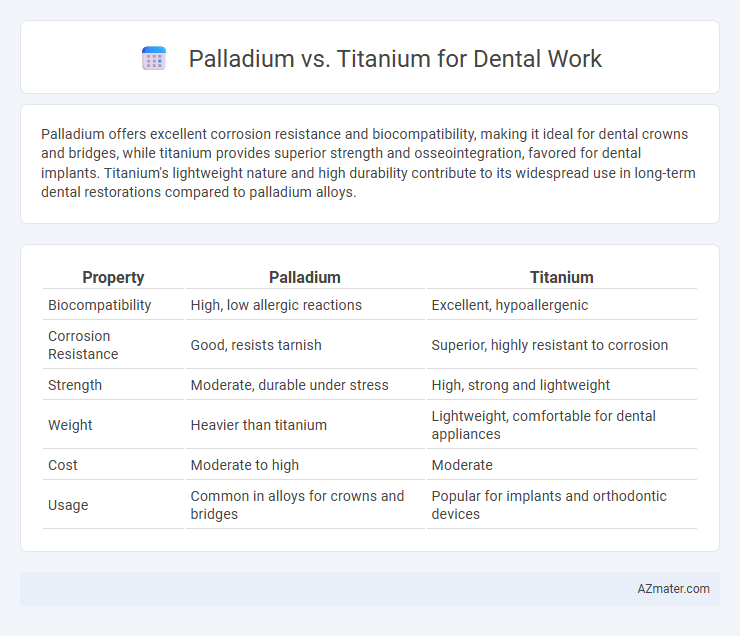Palladium offers excellent corrosion resistance and biocompatibility, making it ideal for dental crowns and bridges, while titanium provides superior strength and osseointegration, favored for dental implants. Titanium's lightweight nature and high durability contribute to its widespread use in long-term dental restorations compared to palladium alloys.
Table of Comparison
| Property | Palladium | Titanium |
|---|---|---|
| Biocompatibility | High, low allergic reactions | Excellent, hypoallergenic |
| Corrosion Resistance | Good, resists tarnish | Superior, highly resistant to corrosion |
| Strength | Moderate, durable under stress | High, strong and lightweight |
| Weight | Heavier than titanium | Lightweight, comfortable for dental appliances |
| Cost | Moderate to high | Moderate |
| Usage | Common in alloys for crowns and bridges | Popular for implants and orthodontic devices |
Palladium vs Titanium: An Overview in Dental Applications
Palladium and titanium exhibit distinct properties influencing their use in dental applications; palladium is prized for its corrosion resistance and hypoallergenic nature, making it suitable for dental crowns and alloys. Titanium offers superior biocompatibility and high strength-to-weight ratio, ideal for dental implants and prosthetics. Comparing palladium vs titanium, the choice depends on specific dental requirements, including longevity, patient sensitivity, and mechanical demands.
Biocompatibility of Palladium and Titanium in Dentistry
Palladium and titanium both exhibit excellent biocompatibility, making them suitable for dental applications. Titanium is highly favored for dental implants due to its ability to osseointegrate, forming a strong bond with jawbone tissue while minimizing allergic reactions. Palladium, commonly used in dental alloys, offers corrosion resistance and biocompatibility but may cause sensitivity in patients with metal allergies, making titanium the preferred choice for long-term oral health.
Strength and Durability: Palladium vs Titanium Dental Materials
Palladium and titanium are both strong and durable materials used in dental work, but titanium offers superior strength-to-weight ratio and exceptional biocompatibility, making it highly resistant to corrosion and wear. Palladium, often alloyed with other metals, provides good strength and corrosion resistance but may cause allergic reactions in sensitive patients. Titanium's long lifespan and minimal risk of metal sensitivity make it a preferred choice for dental implants, crowns, and bridges requiring long-term durability.
Corrosion Resistance in Oral Environments
Palladium exhibits superior corrosion resistance in oral environments due to its inert chemical properties, minimizing the risk of metal ion release and hypersensitivity reactions. Titanium, while highly biocompatible and corrosion-resistant, can still undergo slight oxidation, forming a protective oxide layer that maintains stability in saliva. Both metals offer excellent durability; however, palladium's resistance to tarnishing and corrosion under acidic conditions in the mouth often makes it a preferred choice for long-term dental restorations.
Allergic Reactions and Sensitivity Risks
Palladium is less likely to cause allergic reactions compared to other metals but still poses a risk for patients sensitive to nickel alloys often found in dental restorations. Titanium is renowned for its biocompatibility and minimal allergenic potential, making it the preferred choice for patients with metal sensitivities or allergies. Both metals offer strength and durability; however, titanium's hypoallergenic properties significantly reduce sensitivity risks in dental implants and prosthetics.
Aesthetic Considerations: Color and Finish
Palladium offers a naturally white and lustrous finish that closely mimics the appearance of natural teeth, making it highly desirable for visible dental restorations. Titanium, while exceptionally strong and biocompatible, has a grayish hue that may show through thinner dental ceramics, potentially affecting the aesthetic outcome. Selecting palladium for dental work ensures a brighter, more tooth-like color and a polished surface that enhances smile aesthetics compared to the darker finish of titanium.
Cost Comparison: Palladium vs Titanium Dental Work
Palladium dental work generally costs more than titanium due to the metal's higher market value and its use in premium dental alloys. Titanium is favored for its affordability, durability, and biocompatibility, making it a cost-effective choice for dental implants and restorations. Patients seeking budget-friendly options often prefer titanium, while those prioritizing material prestige may opt for palladium despite increased expenses.
Longevity and Maintenance of Dental Restorations
Palladium dental restorations exhibit excellent longevity due to their corrosion resistance and strong biocompatibility, often lasting over 10-15 years with minimal maintenance. Titanium offers superior strength and is highly resistant to corrosion, making it ideal for implants with a lifespan that can exceed 20 years, requiring routine dental check-ups and professional cleaning to ensure durability. Both materials demand regular oral hygiene, but titanium's osseointegration properties contribute to long-term stability and reduced risk of failure compared to palladium alloys.
Clinical Performance and Dentist Preferences
Palladium exhibits excellent corrosion resistance and biocompatibility, making it a preferred choice for high-quality dental crowns and bridges, especially in patients with metal sensitivities. Titanium is favored for its superior strength-to-weight ratio, osseointegration capabilities, and long-term durability in dental implants, offering exceptional clinical outcomes in load-bearing restorations. Dentists often prefer titanium for implant procedures due to its proven success rates, while palladium remains popular for alloyed dental prosthetics due to its aesthetic compatibility and reduced risk of allergic reactions.
Choosing the Best Material for Your Dental Needs
Palladium and titanium each offer distinct advantages for dental work, with palladium known for its excellent corrosion resistance and natural white color, making it ideal for durable and aesthetically pleasing dental restorations. Titanium provides superior biocompatibility and strength, often preferred for dental implants due to its ability to integrate with bone and minimize allergic reactions. Choosing the best material depends on specific dental needs, including durability, appearance, and patient sensitivity.

Infographic: Palladium vs Titanium for Dental Work
 azmater.com
azmater.com